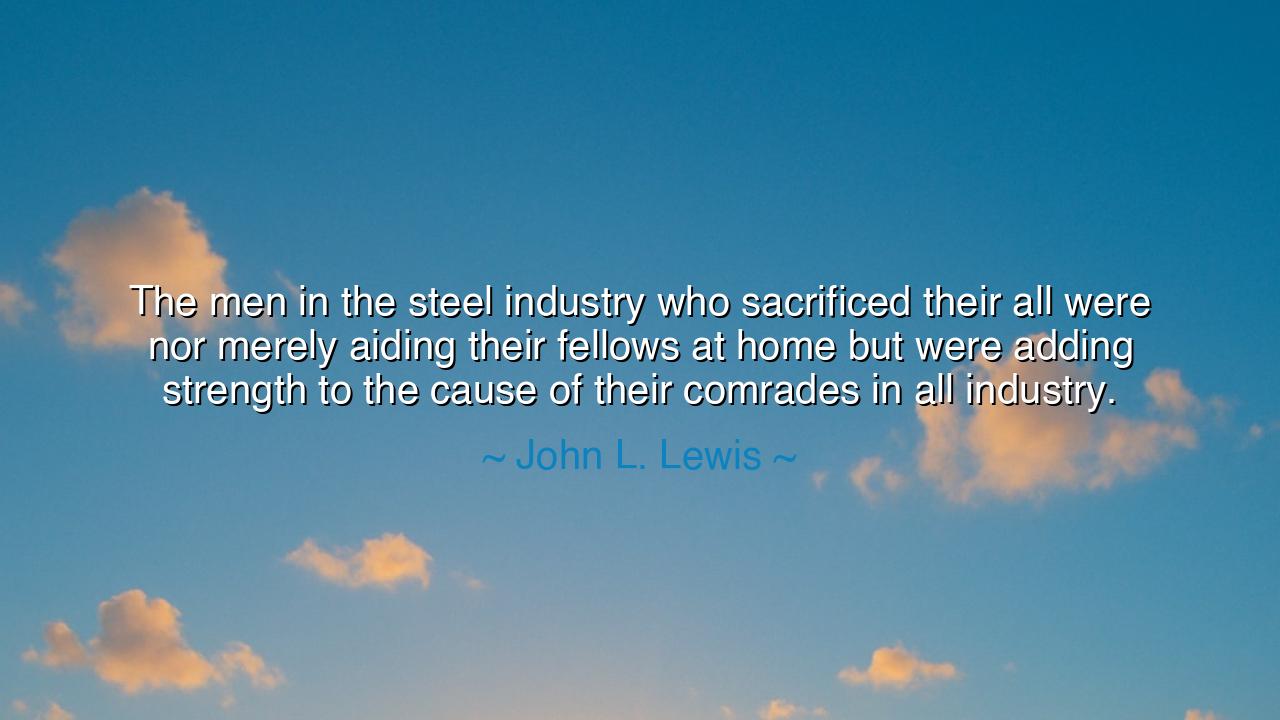
The men in the steel industry who sacrificed their all were nor
The men in the steel industry who sacrificed their all were nor merely aiding their fellows at home but were adding strength to the cause of their comrades in all industry.






In the words of John L. Lewis, the formidable labor leader whose voice thundered through the factories and mines of America, there rings both reverence and revelation: “The men in the steel industry who sacrificed their all were not merely aiding their fellows at home but were adding strength to the cause of their comrades in all industry.” These words, forged in the heat of struggle, stand as a monument to solidarity, the brotherhood of working men whose courage transcended their individual burdens. For Lewis, the fight of one was the fight of all — and every sacrifice made for justice in one field of labor was a victory for all humanity.
To grasp the depth of his words, we must first recall the world in which they were spoken. The early 20th century was an age of industrial might and human toil, when the clang of steel and the smoke of furnaces filled the air, but the hearts of the workers were often heavy with exploitation. The steel mills of Pittsburgh and the mines of Pennsylvania were temples of labor, yet also prisons of hardship. Men worked long hours for meager pay, their bodies broken in service of profit. It was in this crucible that John L. Lewis, leader of the United Mine Workers and architect of the labor movement, raised his voice. He saw in the steelworkers not just individuals, but pillars of a great and common cause — the cause of dignity for all who worked with their hands.
When Lewis declared that these men “were not merely aiding their fellows at home,” he spoke of a truth that the ancients themselves would have understood: that sacrifice for justice transcends the boundaries of one’s immediate circle. Just as the Spartan who fought at Thermopylae did so not only for his city, but for the freedom of all Greece, so too did the steelworker’s strike echo far beyond his factory gates. Every hour of lost pay, every act of courage in the face of oppression, became an offering not for himself alone, but for the generations of laborers yet unborn. For Lewis, the sweat of the worker was sacred — each drop a contribution to the greater covenant of human equality.
The history of labor bears witness to this truth. In 1937, the Memorial Day Massacre in Chicago saw steelworkers gather to demand fair treatment and recognition. They marched peacefully, bearing only the hope of justice, yet met the gunfire of those who feared change. Ten men fell that day, but their deaths did not silence the cause — rather, they ignited it. Lewis saw in their sacrifice the spark of a collective awakening, the unity of workers across all industries who realized that their struggles were intertwined. He taught that no man’s suffering should be isolated, and no victory enjoyed in solitude. The cause of one laborer was the inheritance of all.
This belief in shared struggle reflects an eternal law of humanity — that strength is multiplied through unity, and that the destiny of one group cannot be separated from the fate of the whole. The ancients spoke of this as symmachia, the alliance of hearts and hands for a single purpose. Lewis understood that when the steelworker stood up to injustice, he was not merely improving his own lot, but uplifting the moral stature of all who toil. His victory became a torch that lit the path for miners, machinists, and factory hands across the nation. Thus, the act of sacrifice, though local in circumstance, became universal in spirit — a thread in the great tapestry of human progress.
There is, too, a deep moral lesson in these words — that true service is never self-contained. Every act of courage, every offering made in the name of truth or fairness, reverberates far beyond its point of origin. The soldier who defends the weak, the teacher who lifts a child’s mind, the worker who demands justice — all are bound by the same invisible law. Their deeds, however small, become the foundation upon which freedom and dignity are built. Lewis’s quote reminds us that the measure of sacrifice is not its scale, but its sincerity — for from one honest act of resistance can flow the liberation of thousands.
And so, the teaching that emerges from John L. Lewis’s words is both heroic and humble. Work not only for yourself, but for others. Let your effort become an offering to the greater good, your courage a shield for the vulnerable, your success a seed for the future. Just as the steelworker’s struggle fortified the spirit of all labor, so too can our own perseverance strengthen those around us. In every age, society is forged by those willing to give of themselves so that others may rise.
Therefore, let us remember — every act of sacrifice, when done in the name of justice, becomes immortal. The strength of one is the strength of all. The men who labored in fire and steel did not merely build the engines of industry; they built the moral backbone of a nation. And through their example, John L. Lewis calls to us still: to live not for comfort, but for cause; not for recognition, but for righteousness. For in serving others, we forge a legacy stronger than iron — the unbreakable bond of human solidarity.






AAdministratorAdministrator
Welcome, honored guests. Please leave a comment, we will respond soon